Gingivitis is a fairly common inflammatory condition today, the disease will progress in stages and if not treated promptly, it can lead to dangerous complications for oral health. Gingivitis medications on the market today are quite diverse, so What medicine to take for gingivitis also depends on the inflammatory condition of each person as well as the instructions of a specialist.
1. What is gingivitis?
Gingivitis is a condition that can occur in all subjects, including children and the elderly. This condition occurs due to bacteria and viruses that exist in dental plaque, causing irritation, redness and swelling of the gums. Gingivitis can be easily detected, if the gingivitis is mild, the patient only needs to pay attention to proper oral hygiene and it can heal on its own. However, if left untreated for a long time, gingivitis can lead to complications such as periodontitis, loose teeth and even tooth loss.

2. Causes of gingivitis
To know the best treatment for gingivitis, the doctor needs to find the exact cause of gingivitis. In fact, the main cause of gingivitis is the formation of thick, long-lasting tartar plaque in the oral cavity.
These plaques exist between the tooth root and the gum and are a favorable environment for bacteria to grow and develop, causing damage to the gums. Reasons for the increasing accumulation of tartar include:
– Improper oral care and hygiene habits.
– Regular use of foods that are harmful to oral health such as carbonated water, acidic foods, foods high in sugar, high in starch, etc.
– Due to frequent changes in hormones in pregnant women.
– Due to weakened immune systems in patients with diseases such as cancer, diabetes, etc.
– Due to side effects of some antibiotics such as histamine, antidepressants, etc.
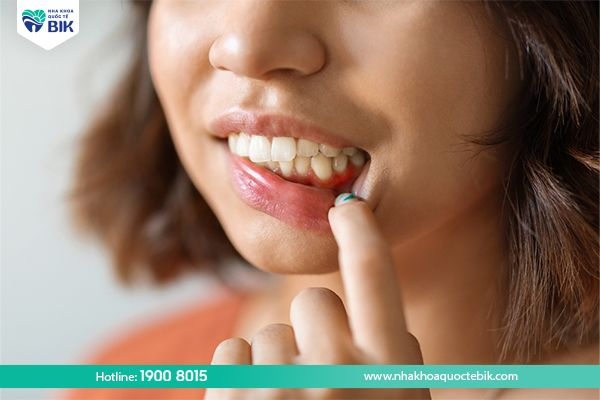
3. Stages of gingivitis
Gingivitis will progress to a serious condition and is divided into different stages:
3.1. Red gingivitis stage
This is the first stage that is common in many people with symptoms of dark red gums, itching and bleeding when brushing teeth or chewing food. Gingivitis can spread to the inside of the cheeks and the edge of the tongue, making the patient feel more uncomfortable. If not treated properly, it will cause sores and ulcers.
3.2. Advanced gingivitis stage
This is the stage where the disease develops more severely, causing swelling and edema, making the patient experience many inconveniences in daily life. At this stage, there is a lot of tartar on the gums and teeth with a thickness of 2mm or more. They are a favorable living environment for bacteria, thereby increasing the risk of diseases such as tooth decay and periodontitis.

3.3. Stage of necrotizing ulcerative gingivitis
This is an extremely serious stage of the disease when the gums are severely damaged, the ulcer can lead to necrosis. In addition, the ulcer on the gum line can spread to the inner edge, to the tongue, causing the patient to feel pain and discomfort, prone to bleeding and bad breath. Gingivitis progressing at this stage not only affects health but also causes other serious oral complications.
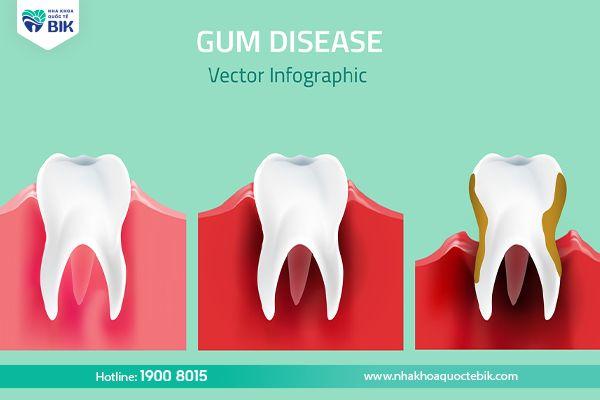
4. What medicine should you take for gingivitis?
Using the right medicine for each person’s condition is very important to bring about the best treatment effect. Here are some types of gingivitis medications that doctors often use:
4.1. Syndent Plus Dental Gel
This is a gingivitis medication belonging to the ETC group in the form of a liquid gel, widely used in the treatment of swollen gums, inflammation, toothache or oral infections. In addition, the product is also prescribed by doctors to effectively remove tartar.
The main ingredients include Lidocaine Hydrochloride anhydrous USP (0.40g), Metronidazole (0.20g) Chlorhexidine Gluconate BP (0.05g) and a few excipients sufficient for 1 tablet.
Instructions for use:
– For adults: Use a sufficient amount of gel to gently apply to the area of teeth with gingivitis 3-4 times a day, reapplying every 3 hours at most.
– For children: Use the same as adults but reduce the dosage to 2-3 times/day, reapply every 6 hours at most, do not use for children under 30 months old.
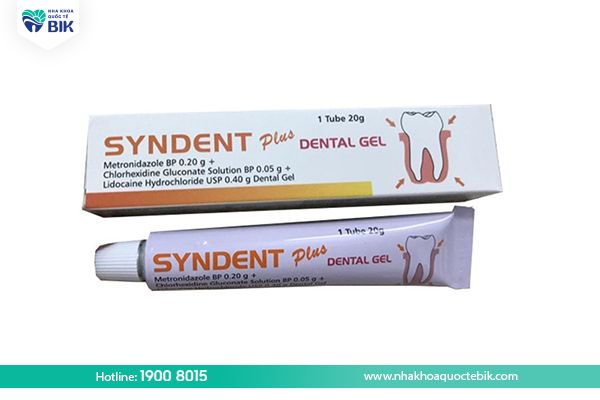
4.2. Naphacogyl gingivitis treatment medicine
Naphacogyl is most effective for oral infections, typically periodontitis, tooth abscess, gingivitis, bleeding gums, etc. In addition, doctors can also prescribe this type of medicine in cases of post-oral surgery to prevent infection. The main ingredients of Naphacogyl are Spiramycin (100000 IU) and Metronidazole (125mg).
Instructions for use:
– For adults: Dosage 4-6 tablets/day, divided into 2 doses, taken during meals.
– For children: Use the same as adults but reduce the dosage by half, to 2 tablets/day.
Note: Do not use for the elderly, in cases of intestinal inflammation, stomach disease, consult a doctor before use.
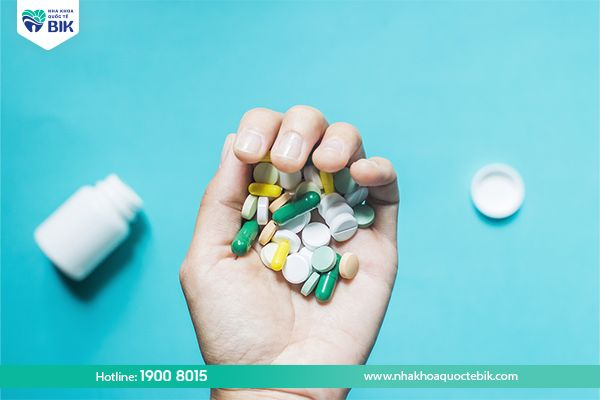
4.3. Emofluor Gel Gingivitis medicine
Emofluor Gel is a gel-like medicine used to treat diseases of the tooth root such as tooth root wear, gingivitis, tooth sensitivity, … In addition, this medicine can also help relieve pain caused by gingivitis, has the effect of preventing damaged tooth enamel, preventing cavities that break teeth.
The main ingredients of Emofluor Gel include Stannous Fluoride, Propylene Glycol, Sodium Saccharin, Glycerin, Aroma, Phosphorylcolamine, Cellulose Gum, PEG-40-Hydrogenated Castor Oil, PEG 8 and Aqua.
Instructions for use:
– Take a sufficient amount of medicine and apply evenly to the inflamed gums.
– Leave it for about 1 minute, then spit it out and do not need to rinse your mouth with water.
– For children over 6 years old.
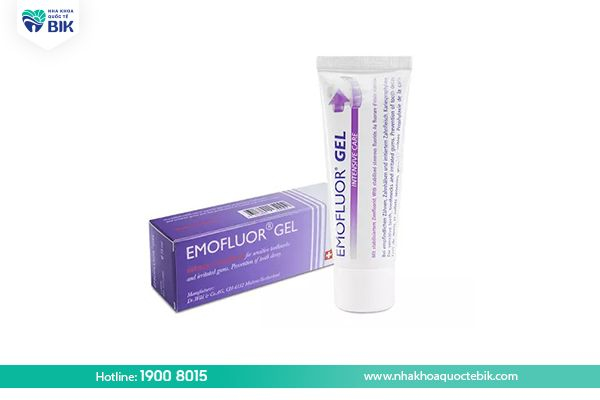
4.4. Anti-gingivitis medicine Amoxicillin
This is an antibiotic that helps prevent bacteria and effectively inhibits the growth of bacteria. Therefore, not only gingivitis but also many other inflammatory conditions such as respiratory tract infections, periodontitis, etc. are prescribed by doctors to use this medicine to overcome. The main ingredients include Amoxicillin 500mg, Colloidal silicon dioxide A200 and Sodium Starch Glycolate, Sodium lauryl sulfate.
Instructions for use:
– Use 3 times/day, each time taking 250 – 350mg depending on each person’s condition.
– Use continuously for 7-10 days to get the best results.
– Note that this medicine only has the effect of preventing and inhibiting bacteria but does not have the effect of killing bacteria.
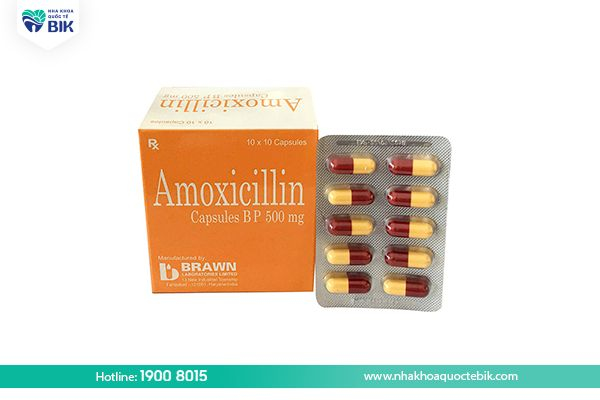
4.5. Clindamycin Gingivitis Medicine
Clindamycin is an antibiotic used in cases of severe infections and acute gingivitis. The drug enters the body and effectively inhibits the growth and development of harmful bacteria.
The main ingredients include Clindamycin Hydrochloride, Sodium Hydrate, water, EDTA, Benzyl Alcohol.
Instructions for use:
– In case of mild gingivitis, use 4 times/day, 150 – 300mg each time.
– In case of severe gingivitis, use 4 times/day, 300 – 450mg each time.
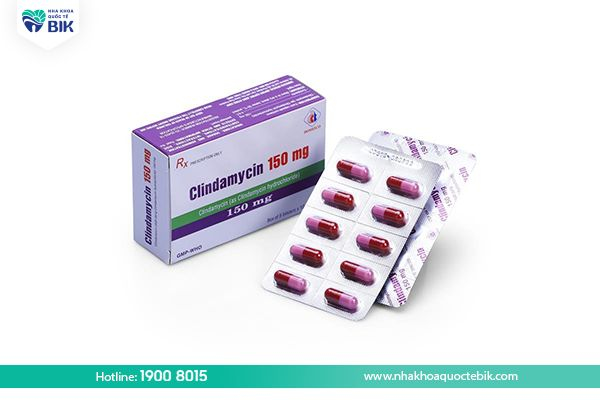
5. Notes when using gingivitis treatment medicine
To ensure that the medicine brings the best treatment effect, patients need to note the following during the treatment process:
5.1. Do not use the medicine on your own
Most gingivitis treatment medicines are antibiotics and should only be used when prescribed by a doctor or with a prescription. Therefore, to ensure safety, patients should not arbitrarily buy medicine or use any medicine without being examined and advised by a medical specialist.
5.2. Proper oral hygiene
In case of using topical gel medications, cleaning your teeth thoroughly can also help the medication maximize its effectiveness. On the contrary, if the oral cavity is not cleaned, there are still many bacteria inside, applying medication can also make the gingivitis worse.
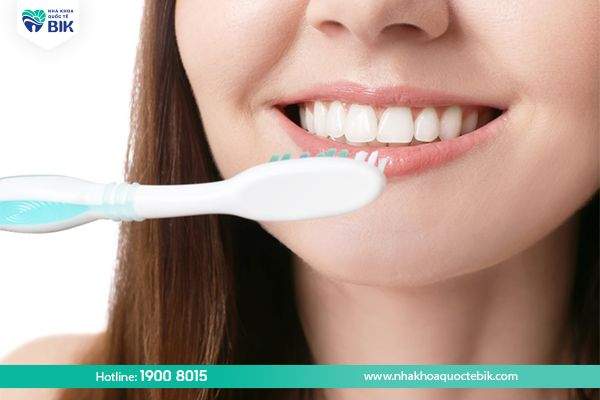
5.3. Pay attention to the accompanying side effects
When using medication to treat gingivitis, side effects are something that anyone can experience. Therefore, if the condition worsens and becomes more serious, the patient needs to go to the dentist immediately for examination and timely treatment. In addition, the patient also needs to pay attention to using the medicine according to the doctor’s instructions to minimize the possible side effects.
So what medicine to take for gingivitis depends on the specific condition of each person. Therefore, the patient needs to go to a reputable dental facility to be examined to find out the specific cause of gingivitis first, then the doctor will prescribe the appropriate treatment to bring the highest efficiency. Note that you should not use any medicine on your own because this may not bring maximum efficiency but also affect your oral health.


















